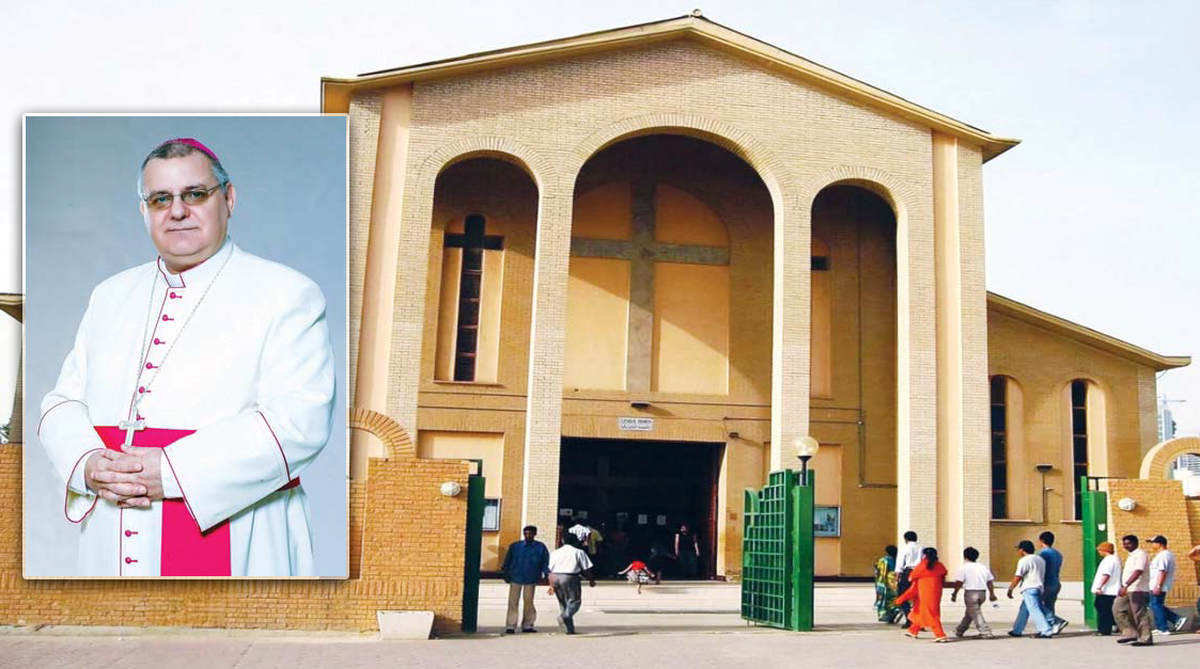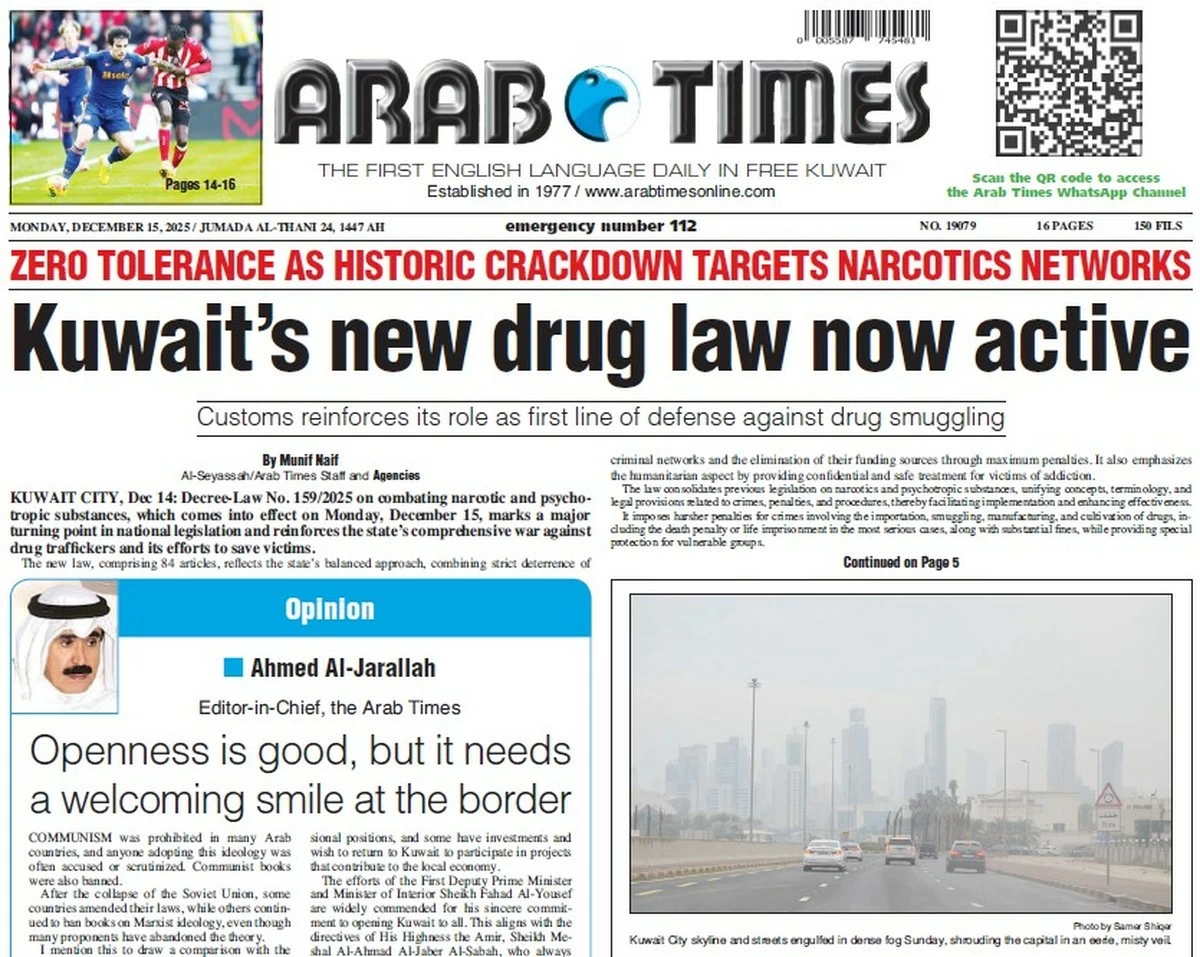14/01/2025
14/01/2025

KUWAIT CITY, Jan 14: The State of Kuwait, a conservative Muslim nation, is a shining example of religious tolerance and coexistence in the region, where diverse religious communities live side by side in harmony. This remarkable environment is a direct reflection of the vision and leadership of Kuwait, whose commitment to peace and inclusivity has shaped the nation’s identity. Under the guidance of the Ruling Family, the Kuwaiti government and with the support of its people, Kuwait has fostered an atmosphere where all religions are respected and freedom of worship is upheld. The country’s rich cultural fabric is woven with respect for differing beliefs, making it a beacon of tolerance and coexistence in the Gulf region.
The steadfast dedication of the Kuwaiti leadership and its citizens to maintaining this peaceful coexistence ensures that Kuwait remains a safe haven for religious freedom and unity in the Arab world. In an exclusive interview with the Arab Times newspaper, HE Bishop Aldo Berardi O.S.S.T., Vicar Apostolic of the Apostolic Vicariate of Northern Arabia said, “The Middle East has always been a region of profound historical and cultural significance and the recent changes and conflicts have undoubtedly shaped its dynamics in unique ways. As a Church, we view these developments with both concern and hope. “However, amid ongoing conflicts in the region, we also witness inspiring examples of resilience, dialogue, and solidarity among people of different faiths,” he said.
In Kuwait, we are blessed to live in a country that promotes coexistence and respect for diverse communities. The government and society here have extended a remarkable level of support to ensure that Christians can worship freely and contribute positively to the nation’s development. This spirit of mutual respect sets an example for the broader region, he added. “Our role as the Church is to continue fostering peace and reconciliation, advocating for the rights and dignity of all people, and being a beacon of hope and service. Despite the challenges, we are confident that faith, love and dialogue will continue to guide us through these transformative times.”
“The mission of the Church,” he said, “has always been one of reconciliation, peace and unity. In the context of the Middle East, where tensions and divisions often define the landscape, the role of the Church becomes even more vital.” “We believe that the Church is not just a spiritual sanctuary but also a bridge-builder. Through our teachings, outreach programs, and partnerships with other faith communities, we aim to foster dialogue, understanding and mutual respect,” he added.
“The Church has always been a source of refuge and support for those in need, especially during times of conflict and displacement. In Gaza, where many are forced to flee their homes due to unfortunate circumstances, the Church has stepped in to shelter those who had no place to flee – the elderly, the women and children – inside a church in Gaza and even in the school, which were partly damaged during the conflict. In Kuwait, the Church plays an important role in supporting those affected indirectly by these crises. Many members of our congregation are expatriates who have family or friends impacted by conflicts in countries such as Syria, Iraq, Yemen and Palestine and we offer them spiritual guidance, a community of solidarity and avenues to contribute to relief efforts.
Speaking of Kuwait, he said, the country has long been a beacon of religious tolerance in the Middle East, and its policies and practices serve as a model for peaceful coexistence among diverse faith communities. The government of Kuwait has shown a genuine commitment to ensuring that religious minorities are respected and allowed to practice their faith freely.
In Kuwait, Bishop Berardi said, “We have two churches catering to about 300,000 people – one in Ahmadi, which was built in 1948 and blessed in 1956 and the second one is the co-cathedral in downtown Kuwait city built (on a piece of land donated by the late Amir HH Sheikh Abdullah Al-Salem Al-Sabah) and was blessed in 1968. This is in addition to other places of worship in Salmiya and Abbasiya. The co-cathedral, HE Bishop Berardi said, is now designated by the National Council of Culture, Arts and Letters as a historic edifice.
“As a Church, we deeply value the hospitality and openness extended by the Kuwaiti authorities. This enables us not only to serve our faithful but also to contribute to the broader society through charitable initiatives, education, and support for the marginalized. We are grateful for the trust and understanding that characterize this relationship and remain committed to working hand in hand with the authorities to foster peace, unity, and shared prosperity,” he said. The Bishop said, “Kuwait’s openness to religious dialogue is a testament to its commitment to fostering harmony and understanding among its diverse communities. Our contribution to this dialogue begins with our commitment to building relationships based on mutual respect and shared values and peaceful coexistence.
Additionally, the Church organizes educational and cultural activities to foster awareness and appreciation of our faith while learning about others. A plaque in English and Arabic that adorns the wall of the co-cathedral speaks volumes, because the land on which this edifice stands is a donation from the late HH Sheikh Abdullah Al-Salim Al-Sabah. The plaque also speaks of Al-Sabah family’s generosity. “The plaque is a symbol of the generosity and spirit of cooperation that exists in Kuwait. It reflects not only the remarkable support of the Al-Sabah family and the government of Kuwait but also the deep-rooted tolerance and respect that the Kuwaiti people have for religious diversity. Kuwait’s leadership has played a crucial role in nurturing this environment of openness, and we are grateful for the opportunity to work within such a framework. Together, we strive to show that cooperation among faiths is not only possible but essential for creating a society rooted in peace, understanding, and respect. We remain committed to these efforts, praying and working for a world where dialogue and solidarity triumph over division and discord.” Our charitable work is another avenue through which we contribute to this dialogue. By serving the marginalized and those in need -- regardless of their religious or cultural background -- we demonstrate the unifying power of love and compassion, which transcends all differences. We are grateful to the Kuwaiti authorities and the broader society for creating an environment that values dialogue and respect. It is our hope and prayer that these efforts will continue to grow, setting an example for peace and understanding in the region. The Church remains committed to being a bridge-builder, working alongside others to ensure that Kuwait remains a beacon of unity and harmony.”
Speaking of religious holidays, he said, “They are a vital part of the Church’s spiritual life, and their celebration offers a profound opportunity to unite our diverse community in faith, joy and fellowship. During major festivals like Christmas, and Easter, Eid and other religious festivities we greet each other in an atmosphere of brotherhood. In Kuwait, during Christmas and Easter, where our congregation comprises people from various cultural backgrounds, the Church organizes special liturgical services, including festive Masses and prayer vigils. In this unique environment, where expatriates form a significant part of the population, these celebrations provide a sense of belonging and connection to one’s homeland while also building bridges across cultures, he added. When asked how His Excellency views the future of Middle from religious point of view, he said, “My hope for the future of the Middle East is of religious harmony and interfaith cooperation.
The Middle East is a cradle of great faith traditions, and I believe it has the potential to be a beacon of peace and unity for the world if its people and leaders commit to fostering mutual respect and understanding.” Interfaith cooperation is crucial in addressing the region’s challenges, from social inequalities to conflicts and displacement. The Church is committed to working alongside other faith leaders to promote values of justice, compassion, and human dignity. By engaging in open and respectful dialogue, we can find common ground and solutions that serve the greater good. Speaking of interfaith dialogue, the Bishop said, “The visit of the interfaith delegation from Bahrain and Kuwait to Pope Francis was a historic and deeply significant moment for the Middle East. It highlighted the shared commitment of the Gulf countries to promoting religious dialogue, peace, and mutual understanding. The very act of bringing together religious leaders and representatives from various faiths to meet with the Holy Father speaks volumes about the region’s growing openness to interfaith cooperation and hope such visits happen on a reciprocal basis. Looking ahead, he said, I pray for the Middle East where diversity is celebrated and where people of all faiths can live side by side in peace.
He added, Pope Francis has always championed for peace, emphasizing the importance of building bridges across religious divides. His Holiness has time and again been calling for peace in Gaza and more often than not his criticisms about the war have fallen on deaf ears in Israel. The Bishop disclosed on Christmas Day the Patriarch of Jerusalem visited Gaza to take stock of the situation and see firsthand how the needy are taken care of who are sheltered in the Church and school in Gaza which were partly damaged by the enemy bombing. He also disclosed that Cardinal Paulini will be visiting Jordan to discuss the conflict in the region. In his message to the youth and future generations, the Bishop said, it is one of hope, unity, and love. “In a world that is increasingly diverse and interconnected, it is essential that we learn to appreciate and respect one another’s differences. Faith, tolerance, and understanding are not just ideals but the guiding principles that can shape a better future for all of us.” Faith, in its many forms, provides us with a foundation for living meaningful lives. It teaches us to love, to forgive, and to be compassionate toward others. It reminds us that our shared humanity is more important than our differences. I encourage young people to cultivate their faith, to draw strength and wisdom from it, and to live in a way that reflects the values they hold dear.
By Paulo Francisco X. Fernandes
Arab Times/Al-Seyassah Staff


